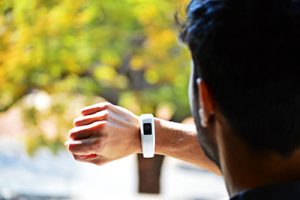How technology is changing the way we keep our hearts healthy

In a time when nearly half of American adults have heart disease, according to the Centers for Disease Control and Prevention, it has never been more crucial for people to make proactive decisions to support the health of their heart. While many are aware of the need to manage their blood pressure and cholesterol levels, serious issues including coronary heart disease and irregular heart rhythms continue to be common, and often overlooked, in people of all ages.
The good news is, as technology continues to advance, new tools and resources are emerging to empower us to make heart-healthy choices and have more meaningful conversations with our care providers. Although consumer technology isn’t meant for self-diagnosis, it does serve as a powerful way to help track personal health data and detect often-subtle heart symptoms. Here are a few technologies I’m seeing my patients use that have been monumental in managing their health from home:
Nutrition Applications: A healthy diet is one of the key ways you can maintain heart health, and there are a variety of mobile applications you can download on your smartphone to more easily track numbers such as caloric intake and nutrients. Apps such as ‘MyFitnessPal’ and ‘Lose It’ allow users to set goals for themselves, track progress with an easy-to-use electronic food diary, and engage with a community of users on health advice and tips. Overall, these apps are a great way to help people hold themselves more accountable in eating a balanced diet that includes nutritious heart-healthy meals.
Activity Trackers: Wearables have become a popular way to track daily physical activity, another key factor to maintaining a healthy heart. Connected wrist bands from companies, such as a Fitbit or Garmin, can track the number of steps you’ve taken or the number of calories you’ve burned each day. This tracking gives you a great way to measure progress against the activity goals you set for yourself. The average person should complete at least 30 minutes of moderate physical activity each day for five days each week, but I always recommend speaking with your healthcare provider to set personal goals that feel right and will lead to a healthier heart.
Apple Watch Series 4: In addition to simple activity trackers, wearable technology continues to advance and offer new tools to be proactive in your heart health. The Apple Watch Series 4 now offers a new electrocardiogram (ECG) application that can record your heart beat patterns and identify potential signs of atrial fibrillation (AFib), one of the leading causes of blood clots and strokes. Signs of AFib, such as shortness of breath or a fast heart rate, often go unrecognized by those who are experiencing them. With this new consumer ECG technology, people now have a new way to get even smarter about their heart health, uncover important symptoms, and make proactive decisions to seek help when needed.
As a cardiologist, it’s exciting to see new consumer technology emerging to empower patients and increase awareness of important health issues. If you’re interested in how this technology can support your cardiovascular health, I recommend visiting your primary care provider to discuss a plan that’s right for you. Pacific Medical Centers’ Renton clinic has a full-service cardiology clinic for more detailed heart testing and diagnosis. Your heart is the most important muscle in your body – now is the time to take proactive steps for a strong and healthy one for years to come.



